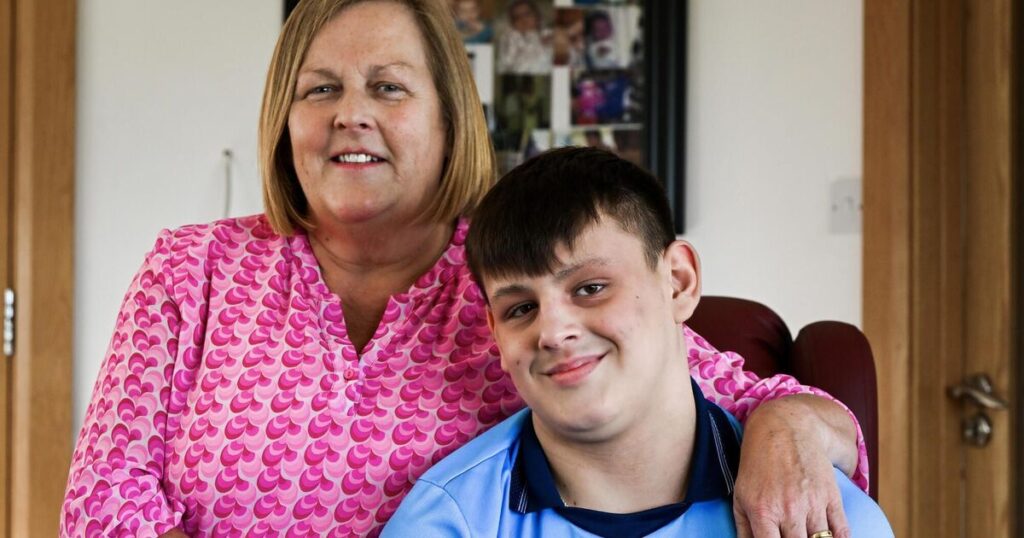He doesn’t go to soccer training anymore, even though he was player of the year for Kanturk AFC, not so long ago.
He doesn’t bother trying to get tickets for the hurling semi-final between Cork and Dublin, even though he’d LOVE to see his county get through to the All-Ireland. He knows he can’t go.
He’s stopped asking his mam if he can go to the local disco. The answer will be no.
He doesn’t worry about end-of-school exams; he didn’t even get to sit them, he was too tired to make it into school.
My nephew Kieran is 16. He’s on the kidney donor list. And all the things that he used to take for granted are out of his reach now.
Kieran suffered complete renal failure, out of the blue, in March last year. Since then, he’s gone from travelling from Bweeng with his mam to Temple Street three times a week, to transferring to CUH when he turned 16 in October.
But his mam couldn’t go in with him for his treatment any more, there’s no space, and in medical terms, he’s an adult now.
So when the nurse asks how he is, he just says fine, even when he’s not. He’s too embarrassed to say he was vomiting for hours that day.
Or that he was scared watching a resuscitation team try to save the man on the bed next to him with a crash cart. He can’t find the words to say he’s worried the line into his heart is infected.
So Kieran and his mam got trained to do dialysis themselves at home this month. Four times a day, every four hours.
While his friends are talking about discos and penos, Kieran is practising tying off lines and helping order an IV pole online. Learning how to disinfect and insert things he shouldn’t know about.
And they never have any reprieve or break, because every day is parcelled into sickness slots; getting ready for dialysis, hooking up to the machine; cleaning up and disposing the waste, then prepping to do it all again, hoping they’re doing it right, because one mistake could be deadly.
He’s one teenager who won’t be given out to about having his phone on him all the time, he’s watching, hoping, for an unknown number, his bag is packed, ready by the front door. Waiting for the unimaginable to happen to another family, for their loss to be his salvation.
It’s a tough thing for a 16-year-old to manage. And for his brother. And his dad. And man-oh-man, it’s hard for his mam.
Life is different now. The constant fatigue — he can’t get out of bed the whole day sometimes.
The restricted diet — he’s either starving or can’t eat at all. The upset stomach. The fear of going anywhere where there are crowds — if he gets a simple bug, his compromised immune system won’t cope.
The complications around toileting. The missing out on simple, silly things, like just hanging around with his friends. We can talk about these things. He has a great sense of humour, he doesn’t complain, he’s a sunny, funny kid.
We don’t talk about the fear. The concrete block in the stomach. We don’t talk about the worry. The constant, gnawing, tumbling thoughts that don’t turn off. What if? What if?
The legislation that kicked in this month simply means everyone over 18 in Ireland is now automatically presumed to consent to donate their heart, lungs, liver, pancreas, or kidney — unless they specifically opt out.
And that’s their prerogative. Of course it is. But please, do know that even under the new system, donation can’t proceed if your family objects. A designated person still must confirm there’s no known objection from the deceased.
Kieran never got to meet his maternal grandfather, but we often tell him the story about his fake eye.
He had a tumour when he was in his 50s, but the eye itself was perfect, and he donated the cornea and the sclera, so two people benefited from his loss.
We, as a family, were proud of that; we always had a donor card in our wallets.
I know none of us wants to talk about our own death. It’s not easy. But it could be the most important conversation you have today.
Just let your family know your thoughts on it all. If your legacy might be giving someone a chance at life, isn’t that worth a chat?
Kieran is one of 500 or so people in Ireland waiting for a kidney transplant. And of course, legislation is just one piece of a much larger, complex puzzle involving trained staff, hospital processes, and the health system logistics.
So when you hear about the law, don’t let it drift past like just another headline. Think of the boy with the bag by the front door.
The one who ties medical lines instead of lacing boots for training. Who doesn’t ask to go out anymore, because he already knows the answer.
Think of Kieran — and the hundreds like him — whose lives are held in place, quietly, painfully, while they wait for that call.
All this law asks is that we talk. That we tell the people we love what we would want, should the unthinkable happen.
One conversation — it won’t cost you anything. But to Kieran, it could mean absolutely everything.
- Please visit ika.ie for more info


